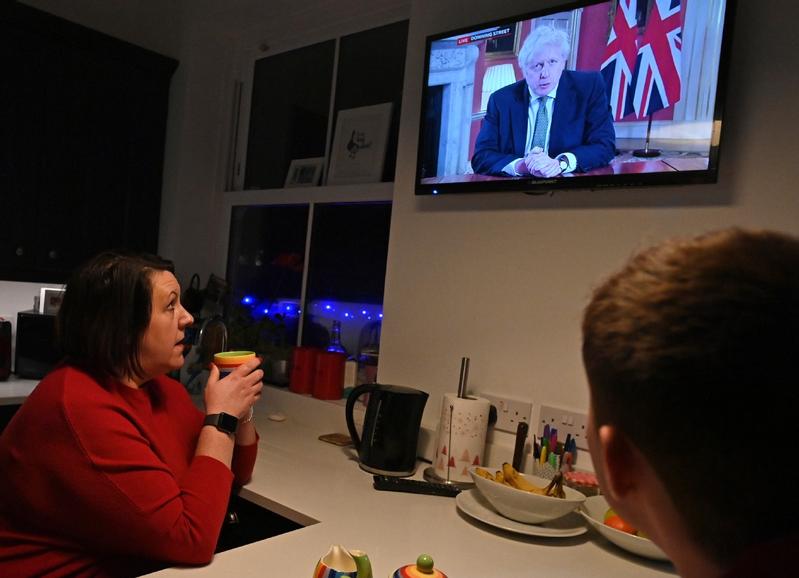 A family from Liverpool watch British Prime Minister Boris Johnson give a televised message to the nation on Monday. (PAUL ELLIS / AFP)
A family from Liverpool watch British Prime Minister Boris Johnson give a televised message to the nation on Monday. (PAUL ELLIS / AFP)
England entered its third period of national lockdown on Tuesday as the government began its latest effort to contain the spread of the novel coronavirus.
The United Kingdom has reported more than 75,500 virus-related deaths, one of the highest tallies in Europe, with nearly 2.7 million cases
According to official figures released on Monday, there were 26,626 COVID-19 patients in hospital in England, which is now more than 40 percent up on the peak of the first wave of infections in April.
Sky News also reported that there was an increase of almost 25 percent in the fatality rate over the previous seven days, compared with the week before.
The United Kingdom has reported more than 75,500 virus-related deaths, one of the highest tallies in Europe, with nearly 2.7 million cases.
The lockdown announcement came after the post-Christmas return to work and school began in chaotic fashion on Monday, with schools closed in some areas but not others.
ALSO READ: Study: US virus cases may be four times more than reported
On Sunday, British Prime Minister Boris Johnson appeared on the BBC, saying: "Schools are safe. It is very, very important to stress that...the risk to kids, to young people is really very, very small indeed ... the risk to staff is very small."
However, the next day he announced schools in England would be shutting, with a review on Feb 15. Schools in Wales have shut for at least two weeks, and students in Northern Ireland will have what has been called an "extended period of remote learning". Scotland's schools are shut until the end of this month.
The new restrictions mean people should only leave home for medical needs, food shopping, work that cannot be done at home, and exercise.
Hospitals, Johnson said, were under "more pressure ... than at any time since the start of the pandemic". He also said everyone aged over 70, all front line social care and health workers, the clinically vulnerable and care home residents and staff will be offered one dose of a vaccine by the middle of next month.
The summer's vital GCSE and A Level school exams have also been canceled, with an announcement about alternative assessment methods due later in the week.
Cabinet Office Minister Michael Gove told the BBC's Today program that school shutdown was a decision taken "very, very reluctantly" and with "the heaviest of hearts", but one that was made after the United Kingdom's chief medical officers recommended the country move to threat level five for COVID-19.
READ MORE: COVID-19, Brexit hand Johnson drubbing in recent opinion poll
Gove added that the coming weeks will be "very, very difficult", but that the expansion of the vaccination program should allow for gradual relaxation as time passes.
"I think it is right to say that as we enter March we should be able to lift some of these restrictions, but not necessarily all."
Agencies contributed to this story.


